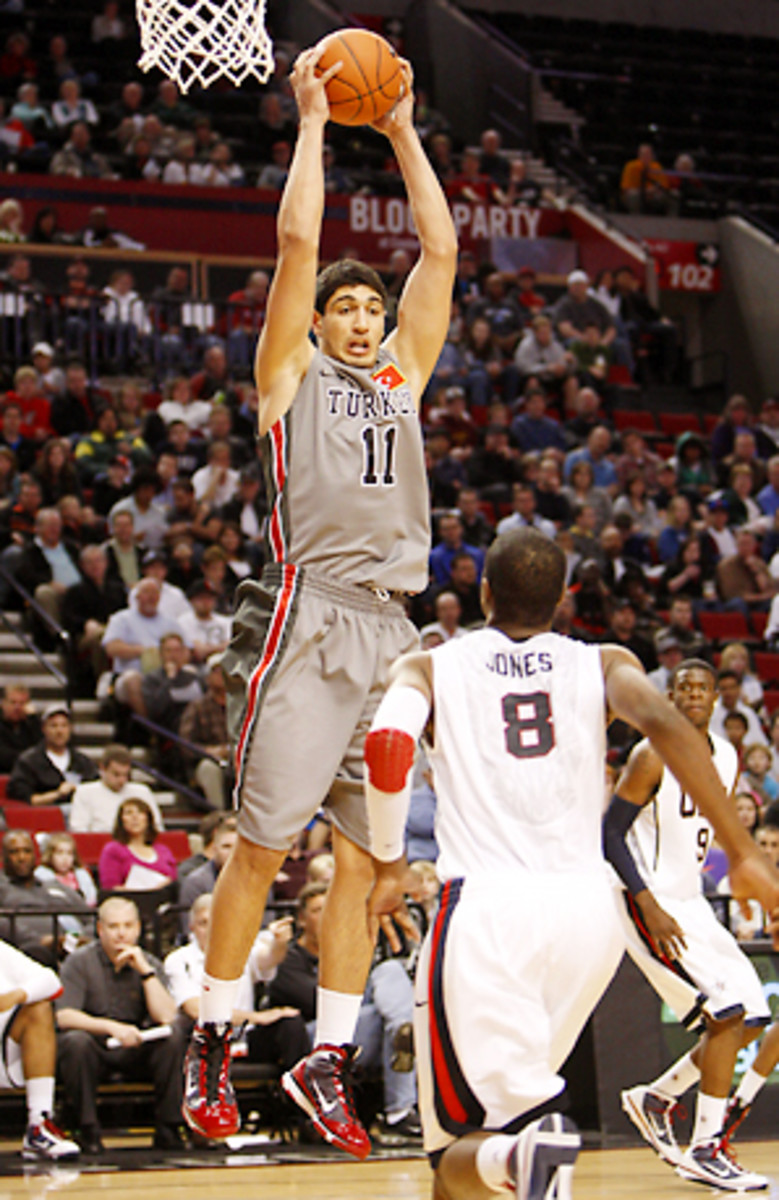
Kentucky faces crippling blow with Kanter's alleged club payments
Thoughts on Tuesday's New York Times report, in which in which Nedim Karakas, the general manager of Turkish club Fenerbahce Ulker, alleges that his team paid more than $100,000 in cash and benefits over three years to Kentucky recruit Enes Kanter:
• The NCAA is still reviewing Kanter's case, Kentucky is defending his status as an amateur, and the public has yet to see the financial documentation Fenerbahce says it gave to the NCAA. But if Fenerbahce's claims are legitimate, there's no chance Kanter will play at Kentucky. The key here isn't the $100-150K that Kanter allegedly received, since amateurs in the European system are allowed to receive necessary travel, lodging and food benefits from their clubs and still be eligible in the eyes of the NCAA. What matters is that Kanter, according to Karakas, was paid a salary for his time with Fenerbahce's senior club. Kanter was not under an official contract, but the Times said he was given "an initial payment of $19,800 and monthly payments of $6,500 during [his] final season with the team."
There is no precedent for a European player paying back salary to his former club team and being allowed to play college basketball in the U.S. The NCAA allows club-connected players to receive basic benefits and nothing more. Last year, when I was writing about West Virginia's Deniz Kilicli, another player who had eligibility issues in making the Turkey-to-NCAA jump, a source told me that the NCAA had even inquired as to what kind of meals Kilicli's old club had provided on the road, insinuating that hamburgers were acceptable, but fine dining would raise red flags. Kanter's alleged benefits are in a whole different stratosphere.
• The sad thing, for Kanter, a 6-foot-11 center who clearly wants to play college basketball far more than he wants to be a European pro, is that the NCAA adjusted its rules this offseason to make it immensely easier for European juniors to be eligible immediately. (We covered this topic in the Tourney Blog in March.) Under the NCAA's old system, European amateurs were punished for merely playing alongside professionals in club games; Kilicli received a 20-game suspension for doing just that. The NCAA's new rules lifted those restrictions and could've made it possible for Kanter, who appeared in at least nine games with Fenerbahce pros, to take the floor in Kentucky's season opener had his salary details not come to light.
• Fenerbahce's claim that it was doing the noble thing by telling the truth about Kanter ("The NCAA's main goal is to protect the amateur side of sports," Karakas told the Times) is disingenuous. The club was irate when Kanter was yanked out of its system -- by his Turkish "advisor," Max Ergul, according to sources -- and transported to the U.S. for prep school last season. Fenerbahce doesn't care about the NCAA or Kentucky; it cares about sending a message that the talent it develops can't be poached. The club also stands to receive a six-figure transfer fee if Kanter were to return to Europe this season and attempt to play for a new team.
• If there's anything good about this for Kentucky, it's that Kanter's alleged benefits were made public before he played for the Wildcats. Had he suited up in official games, and later been outed as a professional, the UK wins would've been voided by the NCAA. Given coach John Calipari's history with vacated Final Four trips -- first at UMass, in 1995-96, and then at Memphis in 2007-08 -- he couldn't afford another scandal. UK can't be subjected to any NCAA punishment for merely trying to get Kanter eligible, because all of his alleged business dealings occurred prior to his arrival in the U.S.
• The bad news -- the really bad news -- for Kentucky is that Kanter is one of the players it can least afford to lose for 2010-11. The Wildcats only have one other center on their roster, Josh Harrellson, who averaged 1.3 points and 1.2 rebounds in very limited action last season. Kanter was expected to start, produce at an all-SEC level in the post, and jump into the NBA Draft Lottery next June. The other elite freshman forward UK landed in its 2010 recruiting class, 6-9 Terrence Jones, is more of a Lamar Odom-type power forward who thrives in faceup situations on offense. Eloy Vargas, a 6-11 junior-college transfer who played sparingly for Florida as a freshman in '08-'09 and isn't regarded as a future first-round pick, could be forced to play big minutes down low for the Wildcats.
Kentucky's primary rivals for the SEC crown each have stronger presences in the paint. Florida brings in beastly 6-9 freshman Patric Young to join 6-8 Alex Tyus and 6-10 Vernon Macklin, and Tennessee is pairing 6-8 phenom Tobias Harris with 6-10, 272-pound Brian Williams. Calipari should be able to adapt his lineup to take advantage of an abundance of quality, big guards -- 6-3 Brandon Knight, 6-4 Doron Lamb, 6-6 DeAndre Liggins, and 6-7 Darius Miller -- but without Kanter, a repeat conference title could be out of reach.





